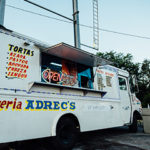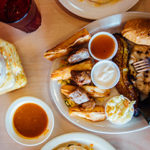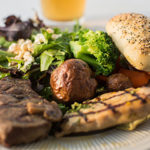Some of our most momentous experiences take place at the table, from holidays to celebrations to business deals. But do we use the authenticity of eating together fully in our work lives, and in the ways we meet?
This was the question that dogged two thirtysomething Los Angelenos, Carolyn Sams and Isis Krause, as they worked together at GOOD magazine and GOODcorps, the magazine’s social-impact consultancy. Krause was a strategist at GOODcorps, while Sams served as GOOD’s creative director — and as both worked with intangibles such as ideas and design, “we started connecting over the idea of making tactile things,” said Sams, who has a background in illustration.
So Sams and Krause first collaborated on a popup community store, and six months later, they cooked a meal for 100 people that was based around stone fruit. More meals followed. “We saw how people opened up over food and had a much more authentic conversation,” said Krause, who attended culinary school. “You’re more of your real self than your work self when you’re eating a delicious meal.”
Fittingly, the idea they eventually hit on — First Seating — came to them over breakfast one morning. “We literally had the same light bulb at the same moment of ‘Wow, what if we gathered people together in this workshop, or meeting-type setting, to talk about these big issues and questions of social impact, of how to do our best work, live our best lives, and do that in a way that’s beautiful and fun and engaging and delicious?” Krause recalled. They hoped to bring entrepreneurs, creatives, or people working in nonprofits together around the table to share ideas in loose, relaxed ways — sort of a goal-oriented fusion of strategy and salmon burgers.
PREP WORK
Krause and Sams left their jobs and founded First Seating in January 2014. GOODcorps hired them for what became their first official workshop. “They took a risk on us,” Krause said, “because they really believed in us, and it was a great way to start our business.”
However, the pair had yet to find a venue. “As a new business, space is hard to come by,” Krause said. And one with a kitchen and a table around which people could gather proved doubly difficult. “So we started using Airbnb as a way to gain access to these inspiring places.”
Their model worked, and First Seating began to grow via word of mouth. The process isn’t solely about food. Sams and Krause request four weeks of lead time to figure out not only what to serve but also the issues their clients would like to address — via half-hour, pre-workshop interviews with each participant. Those insights are drafted into workshop strategies.
“We create 75 percent of the strategy or plan before we even arrive in the room,” Krause said. “We felt like people are always starting from square zero when they arrive in a room together. It’s such precious time to have your entire team take a full day to think through something, so we felt there was a big need for us to do some of that thinking in advance so we could get to a much stronger, deeper place together.”
BREAKING BREAD
Then there’s the food. “We think, what is an ingredient that will make people feel excited and inspired?” Krause said. A recent event featured burrata as the centerpiece; another offered vegan crema-inspired tacos.
A typical First Seating event runs from 9 a.m. to 4 p.m. and features two or three hours of strategy, followed by a break during which participants assemble the meal (prepped by Krause and Sams beforehand), set the table, and sit down to lunch. “[Lunch] is a really nice break after doing so much thinking.” Sams said. Then brainstorming might resume with Krause and Sams — who act as facilitators — providing worksheets and messaging boards to move the group forward.
Most First Seating workshops have taken place in Los Angeles, but also in New York and San Francisco, with groups ranging from two to 100 but averaging between eight to 12. Krause and Sams have noticed that they appeal to “relatively young people who have a startup,” Krause said, “and female executives who want to be collaborative and inclusive in the way that they lead.”
Clients tend to cluster in the nonprofit space, and include the online community I Am That Girl, whose participants ate sweet-potato falafel wraps during a strategy session, and The Pablove Foundation team, who nibbled bánh mì during a mission and vision workshop. “As a creative, young foundation, we wanted to work with someone who would approach a typical team retreat differently,” Jo Ann Thrailkill, Pablove’s CEO and president, says in a case study on First Seating’s website, “and First Seating was a perfect fit.”
Dozens of others agree: First Seating just logged its 60th workshop. “I think we’ve proven that food does open people up,” Sams said, “and you literally have a different conversation when you’re chopping herbs and standing with your coworker side by side.”





